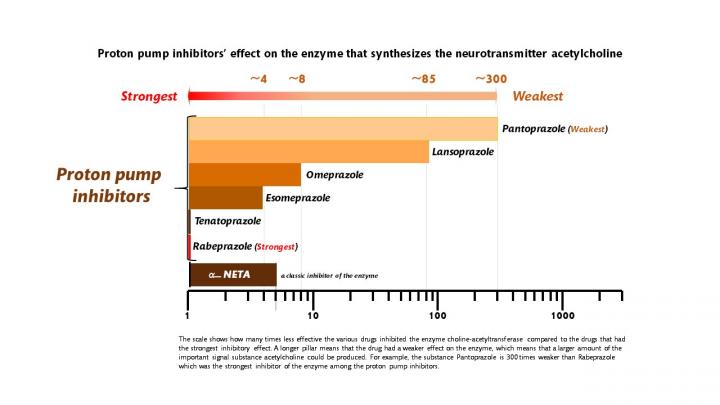
Credit: Taher Darreh-Shori
Millions of people around the world use acid suppressants called proton pump inhibitors for conditions like heartburn, gastritis and stomach ulcers. Researchers at Karolinska Institutet in Sweden now report that how the long-term use of these drugs could increase the risk of developing dementia. Their results are published in the journal Alzheimer’s & Dementia.
“We’ve been able to show that proton pump inhibitors affect the synthesis of the neurotransmitter acetylcholine, which plays a significant part in conditions such as Alzheimer’s disease,” says Taher Darreh-Shori, senior researcher at the Department of Neurobiology, Care Sciences and Society, Karolinska Institutet. “Since there’s no effective treatment for the disease, it’s important to avoid risk factors. We therefore want to draw attention to this so that the drugs aren’t used needlessly for a long time.”
Proton pump inhibitors (PPIs) work by blocking the pumps that transport acidic hydrogen ions from the cells that form the mucosa. When the pumps are out of action, there is a reduction in acid and, ultimately, the corrosive damage it does to tissue. Population studies have previously shown higher rates of dementia in people using PPIs (see background material), but what form such a connection could take has remained unknown – until now.
First, the researchers used 3D computer simulations to examine how six PPI variants based on different active substances interacted with an enzyme called choline acetyletransferase, the function of which is to synthesize the neurotransmitter acetylcholine. As a neurotransmitter, acetylcholine is needed for passing signals among nerve cells, but this only works if enough of the substance is produced. The simulations showed that all the tested drugs were able to bind with the enzyme.
The researchers then analysed the effect of this binding. They found that all the drugs inhibited the enzyme, resulting in a reduced production of acetylcholine, where the stronger the binding, the stronger the inhibitory effect. Drugs based on the active substances omeprazole, esomeprazole, tenatoprazole and rabeprazole had the greatest affinity and were therefore the strongest inhibitors of the enzyme, while the variants pantoprazole and lansoprazole were the weakest (see illustration).
Complementary studies are now needed to examine whether these laboratory observations represent what occurs in the body. However, Darreh-Shori is already advising against the overuse of PPIs.
“Special care should be taken with the more elderly patients and those already diagnosed with dementia,” he says. “The same also applies to patients with muscle weakness diseases such as ALS, as acetylcholine is an essential motor neurotransmitter. In such cases, doctors should use the drugs that have the weakest effect and prescribe them at lowest dose and for as short a time as possible.”
“I would, however, like to stress that the correct use of the drugs is safe also in the elderly, as long as the drugs are used for a limited time and when they’re really needed, as our nervous system is pretty flexible when it comes to tolerating short-term impact,” he adds.
The research was financed by several bodies, including the Alzheimer’s Association (USA), the Swedish Research Council, the Loo & Hans Osterman Foundation and Karolinska Institutet. See the scientific article for a full list of financiers.
###
Publication: “Proton pump inhibitors act with unprecedented potencies as inhibitors of the acetylcholine biosynthesizing enzyme – A plausible missing link for their association with incidence of dementia,” Rajnish Kumar, Amit Kumar, Agneta Nordberg, Bengt Långström and Taher Darreh-Shori, Alzheimer’s & Dementia, online May 8, 2020, doi: 10.1002/alz.12113
Background material:
A large population study in JAMA Neurology showed that people who use PPIs also ran a higher risk of dementia. https:/
A study in Alzheimers Research & Therapy showed that healthy young individuals who took PPIs for ten days performed worse on memory tests than previously, compared with a placebo group. https:/
According to a study published in PLOS ONE the use of PPIs in the population more than doubled from 4 to 9.2 percent between 2002 and 2009. https:/
Media Contact
Press Office, Karolinska Institutet
[email protected]
Original Source
http://dx.
Related Journal Article
http://dx.




